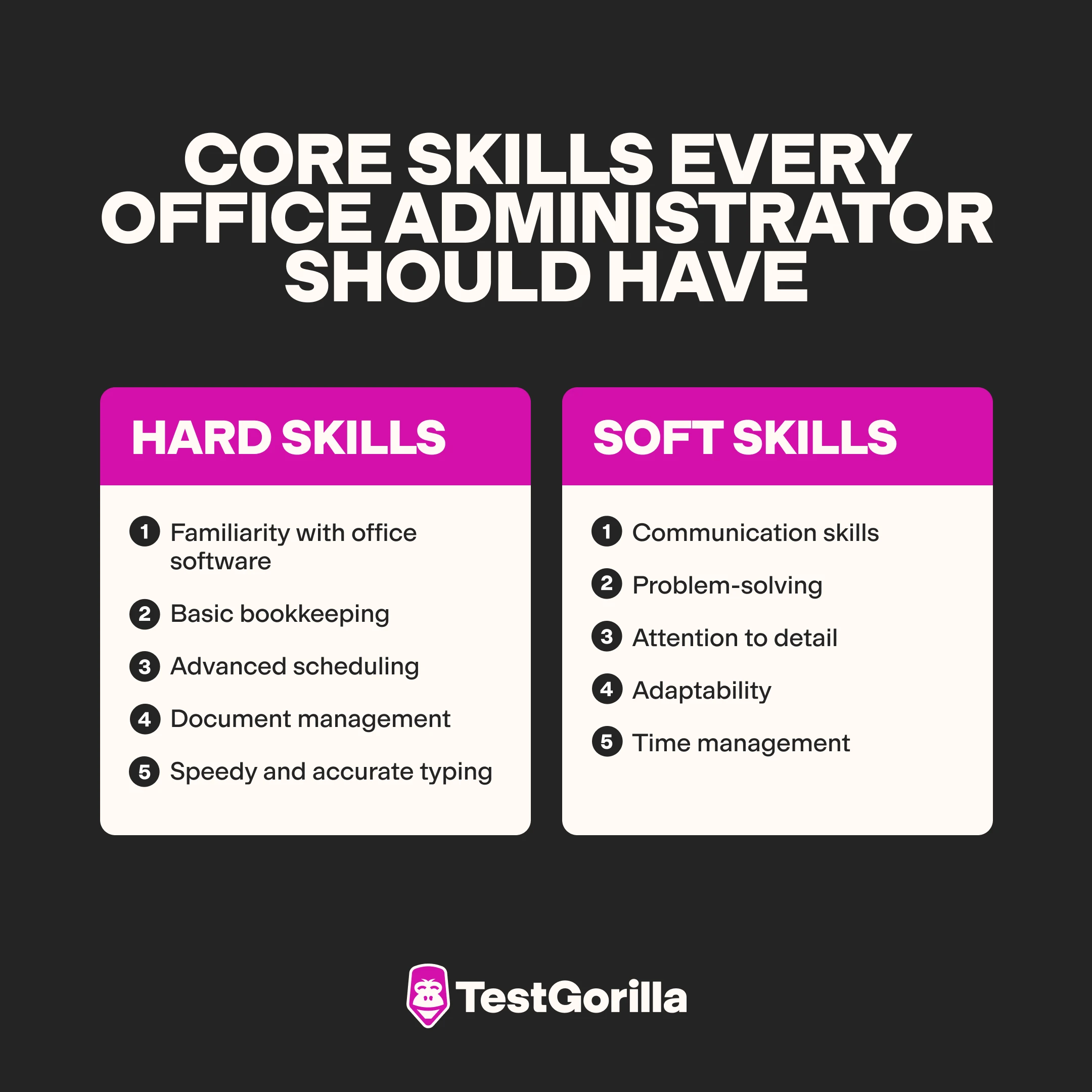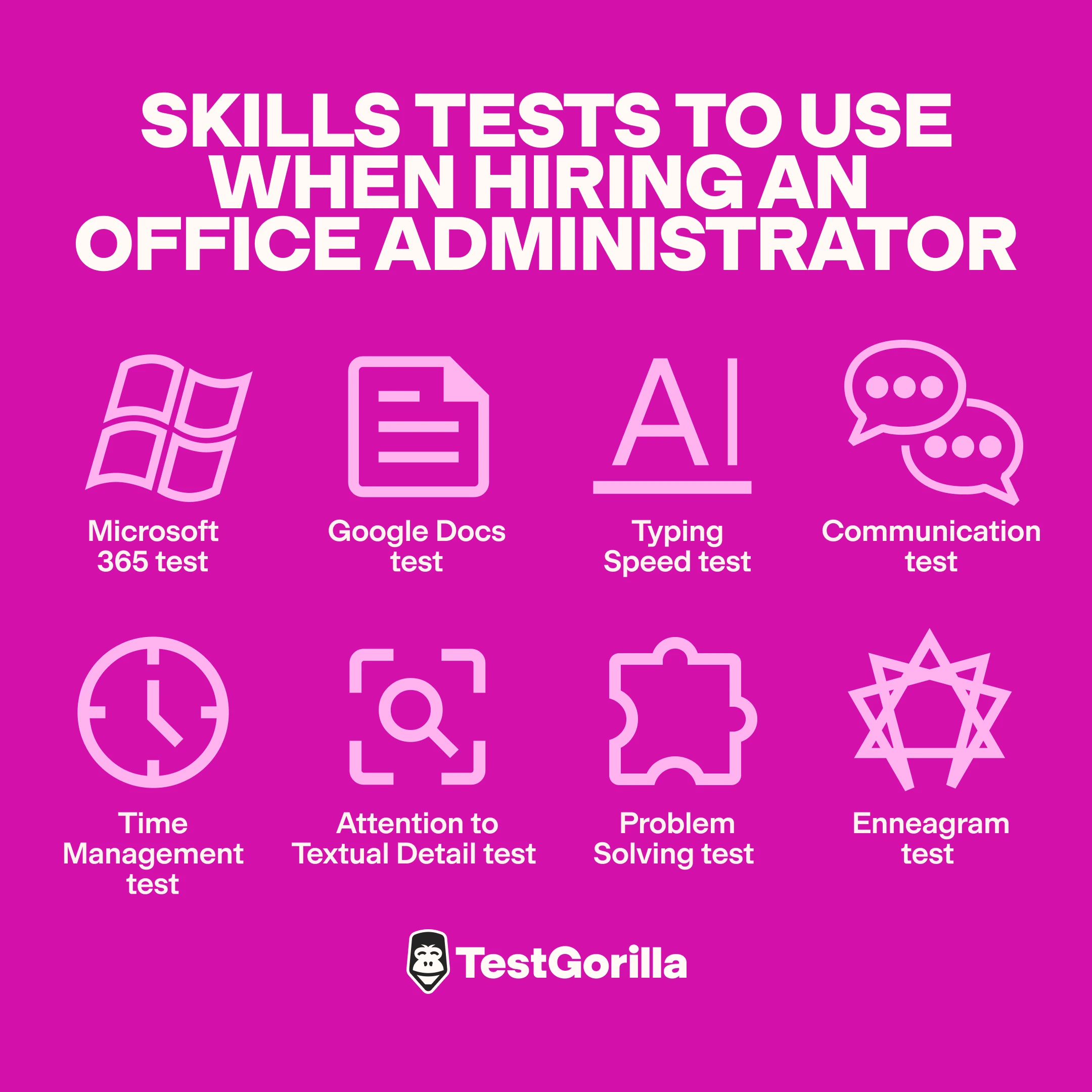Office administrators are the backbone of any well-run office. They seamlessly juggle various tasks to keep everything from scheduling to supplies in check.
But here’s the issue: finding someone who can handle this variety isn’t easy. It’s pretty challenging to pinpoint the exact skills needed for such a broad role, and one wrong hire can lead to more than just a few missed calls – it can disrupt your entire business flow.
Scary, huh?
Well, don’t sweat it. We’ve got your back.
In this article, we’ll dive into the key skills that spell success in this role and show you how to assess them so you can hire a stellar office administrator for your company.
What is an office administrator?
An office administrator organizes and manages the daily operations of an office. They're the ones making sure everything ticks over without a hitch. Here are some of their key daily responsibilities.
Answering phones and managing incoming and outgoing correspondence, including emails, faxes, and mail.
Scheduling meetings, booking appointments, and managing staff calendars.
Maintaining filing systems – both digital and physical.
Ordering and stocking office supplies.
Handling invoices and keeping track of office budgets.
Preparing documents like reports, memos, and letters.
Supporting staff with their projects and tasks.
Coordinating travel arrangements and itineraries.
Managing your office space and addressing any related issues.
They're often the first point of contact for anyone reaching out to your business. On top of that, they work closely with nearly everyone within the office, helping to coordinate efforts across different teams.
English essayist and politician Joseph Addison rightfully said, “No one is more cherished in this world than someone who lightens the burden of another.” And that’s exactly what good office administrators do.
Core skills every office administrator should have
Below are the key skills to look for in your office administrator candidates.
Hard skills
Familiarity with office software: Top office administrators will be very good at using Microsoft Office (or Google Workspace) to prepare docs, work on slides, manage data, and more. It's basically their toolkit for just about everything!
Basic bookkeeping: Handling invoices and keeping an eye on budgets is part of the gig and ensures there are no nasty surprises when it comes to office finances.
Advanced scheduling: Good office administrators juggle multiple calendars at once, making it look like a piece of cake. The best ones will take things up a notch by using smart scheduling tools for quick and error-free scheduling.
Document management: From storing physical papers to keeping digital files in check, office administrators are typically organized and masters in using document management software.
Speedy and accurate typing: Quick typing comes in handy for whipping up minutes, emails, or reports in a flash. No typos, no delays – just precision.
Soft skills
Communication skills: Office administrators communicate with everyone – from clients to employees to vendors. They need to be clear, professional, and accurate in their messaging and keep everyone on the same page.
Problem-solving: Their knack for identifying issues and coming up with quick solutions is key to keeping the office running when unexpected challenges arise.
Attention to detail: Being meticulous helps office admins avoid data entry errors, scheduling conflicts, an undersupply of office materials, and other mistakes – big or small.
Adaptability: New software? Change in procedures? Office move? No problem! Good office administrators roll with the punches and keep everything running smoothly.
Time management: Office administrators multitask all the time, dealing with various requests that pop up out of nowhere. The best candidates will be great at prioritizing their tasks and managing not just their own time but also others’ time.
The best insights on HR and recruitment, delivered to your inbox.
Biweekly updates. No spam. Unsubscribe any time.
How to assess office administrator candidates
Knowing what skills to look for is the first step to hiring a good office administrator. But you must properly assess these skills to make confident decisions about your top choice. TestGorilla’s talent assessments make it quick and easy to do this.
Our ever-growing library offers 400+ tests to choose from. You can pick up to five and combine them into a single multi-measure assessment for your office administrator position. Here are some ideas to get you started.
Assess candidates’ hard skills
First, check that your candidates have the hard skills and knowledge needed for the role. The below tests are perfect for this.
Our Microsoft 365 (Bundle) test is a one-stop shop to check if your candidates are familiar with using Microsoft Word, Excel, PowerPoint, and other apps in the Microsoft suite for managing data, doing basic bookkeeping, tracking office supplies, scheduling meetings, and performing other daily tasks.
The Google Docs Test, Google Sheets test, and Google Slides test work best if your office administrator will be using Google Suite for their daily duties.
TestGorilla’s Typing Speed (Capitalization and Punctuation) test or Typing Speed (Lowercase Only) test are excellent ways to see how quickly and accurately your candidates can type text. You can also use the 10-Key Typing (Numbers Only) test if you’re expecting your office administrator to support data entry tasks.
Take a close look at these soft skills and traits
Next, consider these tests to vet applicants’ soft skills and personality traits.
Our Communications test helps to make sure you’re hiring someone who can speak and write clearly and professionally, especially since office administrators manage both internal and external comms.
The Time Management test lets you assess how applicants plan and prioritize their tasks so you can make sure they can meet deadlines and are always on top of their game.
TestGorilla’s Attention to Detail (Textual) test gives you clarity on candidates’ eye for detail, separating those who can quickly identify and fix mistakes from those who’ll let them slip.
Our Problem Solving test is excellent for spotting talent who correctly define problems and come up with quick and effective solutions – key to success in this job. This test also covers scheduling scenarios, making it super relevant to office admins.
TestGorilla’s Enneagram test – along with our 16 Personalities, DISC, and other personality assessments – enables you to get to know the person behind an application. For instance, are they adaptable and resilient? Are they friendly and approachable?
Determine their cultural and motivational expectations
Even the most skilled candidates won’t work out if they’re unhappy with their job or culture. Use the below tests to prevent this scenario in your company.
Our Culture Add test doesn’t just tell you if a candidate will mesh with your values and culture but also helps you see if they can add something positive to the office. Here’s how it works: You complete a survey ranking the values and behaviors important to the job and company. Candidates then take the same test so you can see if you’re aligned.
The Motivation test also lets you and your candidates complete a customized survey that determines if your job offer aligns with their expectations. This way, you can resolve any issues and concerns promptly.
Get to know shortlisted applicants through behavioral interviews
Finally, while testing is the best way to screen your applicants, you still need to interview them to better understand their backgrounds, skills, and attitudes. This is where behavioral interviews come into play. Consider asking your candidates questions like:
Tell me about a situation where you had to coordinate between multiple departments to get a job done. How did you handle it?
This question looks at the candidate's ability to bridge different teams, deal with complex interpersonal dynamics, and keep projects moving forward smoothly.
Have you ever noticed a mistake that no one else caught? What was it and what did you do about it?
This question helps you look for meticulousness and a proactive attitude. It helps you understand if the candidate is detail-oriented and whether they take the initiative to address issues before they become problems.
Looking for more questions? Check out our guide with 20 interview questions for office administrators.
3 mistakes to avoid when assessing office administrator candidates
Steer clear of these mistakes typical to an office administrator hiring process.
1. Hiring based on generic administrative skills
Office administrators need more than just the ability to answer phones and file documents. They should have a strong grasp of managing office expenses, overseeing complex scheduling systems, and coordinating projects that keep the whole office on track.
If you assess admin assistant skills only, you might end up with someone who’s only familiar with basic admin tasks but might struggle with their daily duties. Make sure to ask pointed questions about their experience with managing previous offices – or give them made up scenarios about office management to see how they’d handle them.
2. Overlooking resilience
An office administrator faces daily challenges such as last-minute schedule changes or unexpected office issues. Someone who isn’t resilient might crumble under the pressure, causing more chaos in the office.
Ask candidates about times they’ve bounced back from tough situations or had to adapt quickly so you can get a better picture of their suitability for the job. You can also make up scenarios involving common office issues – like a shortage in essential office supplies before an important meeting – and ask them how they’d deal with the issues.
3. Ignoring specific software proficiency
Today's office administrators use a range of tools beyond basic office software. This can include scheduling software, document management systems, and invoice management platforms.
Hiring someone who isn’t comfortable with technology can slow down processes and add pressure on other team members, which is contrary to what good office administrators do. During the interview, discuss the technologies your office uses and ask candidates to describe their experience with similar tools.
FAQs
Want to learn more about office administrators? Check out our answers to these frequently asked questions.
Is a secretary an office administrator?
No, not exactly. While both roles handle administrative tasks, an office administrator often has more responsibilities – like managing budgets and coordinating between departments. A secretary typically focuses more on clerical tasks, such as answering phones and scheduling appointments, and usually works with only one person.
What is the highest salary for an office administrator?
The highest salary can vary widely based on location and experience, but according to Indeed’s 2024 data, some top office administrators can earn up to $27.56 per hour.
Can anyone be an office administrator?
Not really. It takes specific skills like organization, tech-savviness, and good communication to be a good office administrator. That said – one doesn’t need a degree to get this job, as it can be learned through alternative routes like self-study, job shadowing, and hands-on experience.
What is the career progression for an office administrator?
An office administrator can advance to higher administrative roles – like office manager or executive assistant – and eventually move into higher management positions as they pick up the skills needed for the job.
Hire top-notch office administrators with TestGorilla
Picking the right office administrator isn't just about checking off a list of administrative skills. It's about finding someone who can really keep your office in tip-top shape and make it seem like everything's running on autopilot.
So, how do you ensure you're choosing a standout office administrator? TestGorilla’s talent assessments, of course! Our comprehensive tests dive deep into candidates’ capabilities – from their technical know-how to their soft skills and personality traits. We’ve got it all covered.
Ready to find your office superstar? Explore our full suite of tests, book a live demo, or create a free account today.
Related posts
You've scrolled this far
Why not try TestGorilla for free, and see what happens when you put skills first.
















